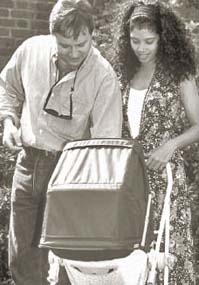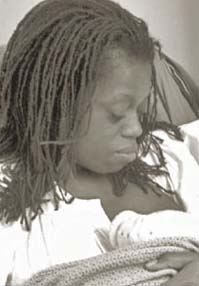7 Different babies, different families
In the first part of the course we learned that babies can do more than adults think, despite having not been in the world for long. We then looked at how adults and older children can help babies learn and develop. What the extracts have shown is that:
babies’ temperament
how they experience the world
how they behave towards other humans and
how humans behave towards them
all matter, and that babies are a product of them all.
The next activity gives you a chance to think about different babies and their different and similar needs. We also look at the different expectations carers have of babies, and what this might mean for the babies while they grow up.
Activity 7: Babies are different
On the same day that Mia was born, ten other babies were born in the hospital. Two of them were in the room with Mia and Jodie, and Jodie got to know the families while they were there. She collected accounts from them.
Read through the accounts of each baby, and think about the following questions. We have also included the accounts of Mia from earlier.
What individual characteristics do you think each baby has?
What hopes, expectations and concerns do the parents express about their baby?
What do you think each baby needs from its carers? Are there any differences between Mia, Tembi and Harish?
Are there differences in the way Mia, as a girl, and the boys are talked about in the accounts?
Record your thoughts on the chart in Table 3 (which has also been produced as a PDF for you to download and print). We have filled in some points for Mia to get you started, but you may want to add more.
| Baby | What baby is like | What family expect | What baby needs |
|---|---|---|---|
| Mia | Tiny, delicate, good at communicating, happy, alert, contented, musical | She will be musical. She will be sociable and enjoy company | Love, attention, time to play, feeding and keeping clean |
| Harish | |||
| Tembi |
View table 3 [Tip: hold Ctrl and click a link to open it in a new tab. (Hide tip)]
What the parents thought
Mia
Harish
Harish is the first-born child of Meera and Jonathan. Meera is a general practitioner in a village practice and Jonathan is self-employed as an architect. Meera is an only child but her parents are from large families and all live quite close by. Harish will have many relatives to get to know. Jonathan's family live in Scotland, where he has five sisters and brothers all living reasonably close to each other. Harish is the youngest of ten grandchildren to his family in Scotland, but the first to his family in England.

Tembi
Tembi is the first-born child of Safiya and Abena. Safiya is a community worker and Abena is studying to be a veterinary surgeon. Tembi will have grandparents and other relatives in London from Safiya's family, and Abena's father is in Liverpool. The couple are active in the local lesbian community and also jointly co-ordinate a group for African women. Tembi has a sperm-donor father.

Discussion
How did you get on? Did you find many differences between the babies?
We noted that all the babies needed attention, comfort, food, shelter, to be touched, and somewhere to sleep peacefully.
We also noticed some differences. Mia is perceived as ‘delicate’ and Harish is described as protesting loudly when he is hungry or uncomfortable.
Tembi comes over as quite demanding and robust. There are often differences in the way babies are described because of their gender. For example, ‘tiny’ and ‘peaceful’ are often used to describe girls whereas a boy might be described more neutrally as ‘small’ or ‘quiet’. Girls are less likely to be described as ‘robust’ or ‘protesting loudly’ as angry or noisy behaviour is generally not encouraged in girls.
One reader commented how she really identified with the mothers of Tembi: ‘My son had so much energy he wore me out. The only way I managed was to have as many people as possible to share his care with me. Luckily, he didn't mind and has grown up to be a really sociable four-year-old.’
All of the families have expectations that their babies will be able to ‘fit in’ with established lifestyles, and this may be more or less difficult depending upon each baby's personality and the particular expectations. Harish, as a baby who quickly expresses discomfort, may find travelling and changes in routine difficult. He may also experience negative reactions to his hearing impairment. Tembi's robust character may help him to forge a strong identity if, as his family fear, he does face prejudice due to being the son of a black lesbian couple. For all of these babies, the development of their personalities will be as a result of a combination of the characteristics that they are born with and the way in which people around respond to them.
